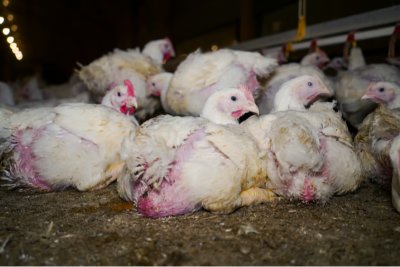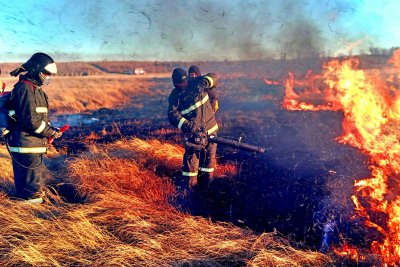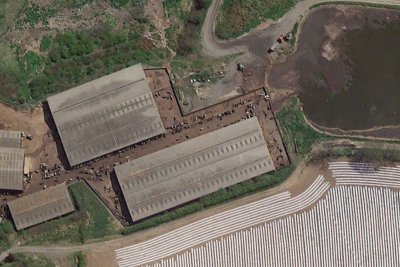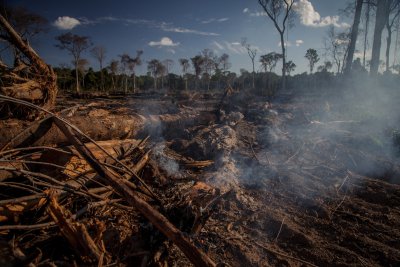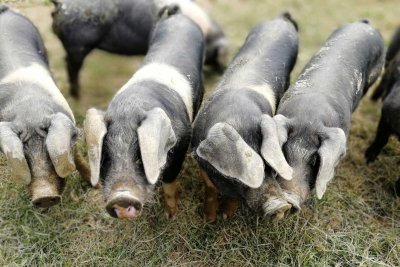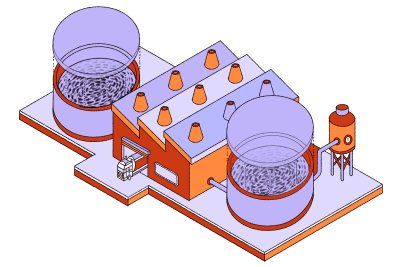Another industrial-scale poultry development in Norfolk has been stopped in its tracks after failures to consider environmental impacts and flaws in the council’s decision-making process were exposed.
North Norfolk District Council has agreed to quash its approval for a large intensive poultry unit at Shrubbs Farm, planned to hold 310,000 chickens in six sheds alongside a biomass plant, feed silos, and other infrastructure covering land equivalent to around seven football pitches.
The Coalition Against Factory Farming (CAFF) warned that the council’s original decision failed to consider key environmental risks and thus failed to allow necessary scrutiny by the public and decisionmakers.
A pre-action protocol letter was sent to the council by legal firm Leigh Day, threatening judicial review unless the approval was reversed. The council has now confirmed it will re-determine the application and reopen it for public consultation. Key problems in the application included:
- Failure to consider of the impact of spreading wastewater and other ammonia-laden material on land
- Failure to assess potential contamination of soil and groundwater
- No evident assessment of the impact of airborne pollutants on nearby protected nature sites.
- Failure to disclose the likely climate impacts of the development, including an assessment of the direct and indirect greenhouse gas emissions from the development, and whether these impacts are compatible with climate and nature targets, despite clear legal precedent that such impacts must be considered in planning decisions.
They also criticised the council for disregarding animal welfare as a material planning consideration and for not conducting a formal public consultation.
This is the second major victory for communities and advocates against the expansion of intensive livestock production in Norfolk in months. In April, West Norfolk councillors rejected Cranswick’s proposed Methwold mega-farm, which would have housed 714,000 chickens and 14,000 pigs, after a campaign led by local residents, Sustain, FoodRise, and WWF, supported by legal arguments showing the application failed to meet greenhouse gas assessment requirements as was required by law.
The Methwold decision, which also cited flawed ammonia modelling, demonstrated that councils can and must reject ILUs when environmental impact assessments are incomplete. That case is now widely seen as a blueprint for future challenges.
Maya Pardo, legal strategy coordinator at CAFF said:
“Industrial-scale farms are multiplying across Norfolk, so it's more vital than ever that councils thoroughly assess their impact, and listen to local voices before granting approvals.”
The case is the second time that serious flaws in the planning application and council decision-making process for intensive livestock units has been exposed. Sustain is urging communities to:
- Look carefully at planning applications locally – there may be flaws that present an opportunity for legal action
- Use Sustain’s Activist's Toolkit to help understand how you can use your power
Sustain is also urging councils to take action to prevent thmselves facing potentially costly legal action and the environmental and health damage caused by ILUs, including:
- Rejecting any application without a full and quantified GHG assessment.
- Fully considering the impacts of agricultural developments on soil, air, water, biodiversity, and public health.
- Ensuring a comprehensive waste management plan is in place for all agricultural developments, including demonstrating that the spreading of manure and slurry won't exceed nutrient budgets.
- Engaging meaningfully with local communities and affected residents before making decisions.
- Developing planning policies that ensure that planning supports sustainable farming, including ensuring all agriculture applications contain the necessary information.
Ruth Westcott, Climate and Nature Emergency Manager at Sustain said:
"The era of unchecked expansion of industrial poultry and pig units is coming to an end. We have laws in place to protect our environment, and as communities and campaigners we will hold decision-makers to these laws. Councils can, and should, stand up to polluting agribusiness and support sustainable farming instead. Congratulations to everyone who made this happen. It’s a huge victory for the community and our future."
Sustain is working with local authorities to put in place robust planning policy and guidance that ensures future decisions are legally sound and environmentally responsible. Get in touch with info@foodfortheplanet.org.uk for more information.
Battery chickens in an intensive livestock unit. Copyright: World Animal Protection / Tracks Investigation
Sustain: Sustain The alliance for better food and farming advocates food and agriculture policies and practices that enhance the health and welfare of people and animals, improve the working and living environment, enrich society and culture and promote equity.
